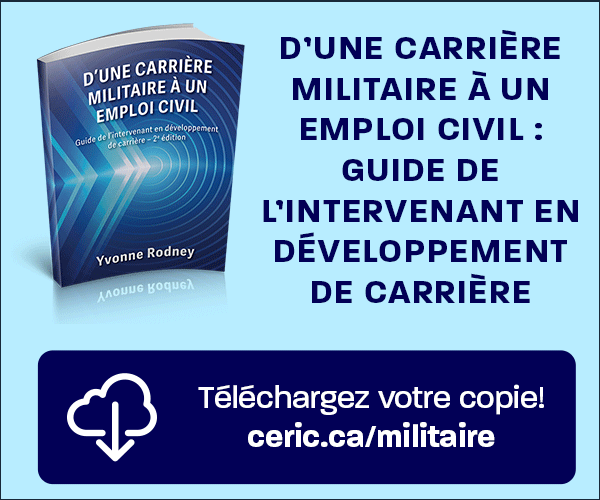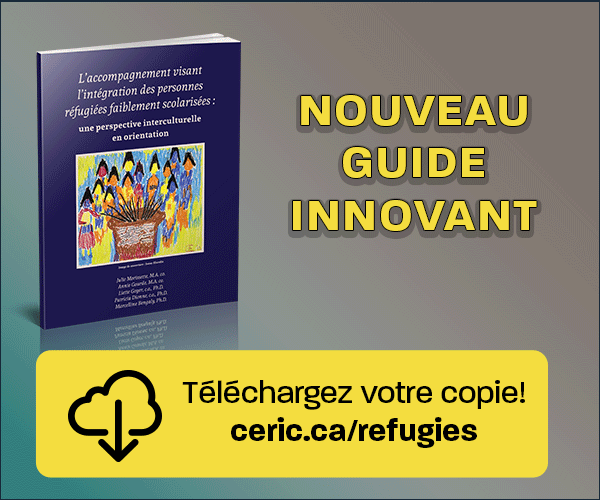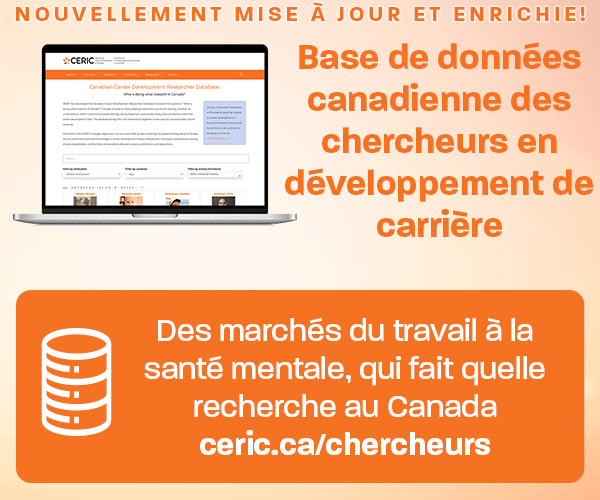Intelligence émotionnelle et bien-être au travail
DOI :
https://doi.org/10.53379/cjcd.2025.421Mots-clés :
l'intelligence émotionnelle, bien-être professionnel, théories de la carrière, les interventions de conseilRésumé
L'intelligence émotionnelle (IE) désigne l'aptitude émotionnelle humaine qui représente une capacité inhérente d'apprentissage ou de compréhension dans l'interaction humaine et les relations interpersonnelles. La recherche suggère que les compétences sociales et émotionnelles, telles que représentées par l'IE, sont des prédicteurs significatifs de la réussite des individus dans leur vie et leur carrière. À cette fin, cet article aborde le rôle de l'IE dans le contexte de la psychologie de la vocation et de la carrière. Guidé et informé par les principales théories de la carrière, il proposera des interventions de conseil susceptibles d'aider les personnes ayant une faible IE à améliorer leur capacité à faire face à leur vie professionnelle de manière plus efficace
Références
Adeoye, H., & Torubelli, V. (2011). Emotional intelligence and human relationship management as predictors of organizational commitment. IFE PsychologIA : An International Journal, 19(2), 212–226. https://doi.org/10.4314/ifep.v19i2.69532
Agu, S.A., & Nwankwo, B. E. (2019). The role of psychological wellbeing and emotional intelligence in maintaining healthy interpersonal relationship. Nigerian Journal of Social Psychology, 2(1). https://nigerianjsp.com/index.php/NJSP/article/view/28
Bandura, A. (1995). Exercise of personal and collective efficacy in changing societies. In A. Bandura (Ed.), Self-efficacy in changing societies (pp. 1–45). Cambridge University Press.
Brackett, M. A., & Katulak, N. A. (2007). Emotional intelligence in the classroom: skill-based training for teachers and students. In J. Ciarrochi & J. D. Mayer (Eds.), Applying Emotional Intelligence: A practitioner’s guide (1-27). Psychology Press.
Bru-Luna, L. M., Martí-Vilar, M., Merino-Soto, C., & Cervera-Santiago, J. L. (2021). Emotional intelligence measures: a systematic review. Healthcare, 9(12), 1696. https://doi.org/10.3390/healthcare9121696
Clark, M. A., Robertson, M. M., & Young, S. (2019). “I feel your pain”: A critical review of organizational research on empathy. Journal of Organizational Behavior, 40(2), 166–192. https://doi.org/10.1002/job.2348
Cochran, L. (1997). Career counseling: A narrative approach. Sage publications.
Cuff, B. M. P., Brown, S. J., Taylor, L., & Howat, D. J. (2016). Empathy: A review of the concept. Emotion Review, 8(2), 144–153. https://doi.org/10.1177/1754073914558466
Dacre Pool, L., & Qualter, P. (2012). Improving emotional intelligence and emotional self-efficacy through a teaching intervention for university students. Learning and Individual Differences, 22(3), 306-312.
Drigas, A. S., & Papoutsi, C. (2018). A new layered model on emotional intelligence. Behavioral Sciences, 8(5), 45. https://doi.org/10.3390/bs8050045
Extremera, N., Sánchez-Álvarez, N., & Rey, L. (2020). Pathways between ability emotional intelligence and subjective well-being: Bridging links through cognitive emotion regulation strategies. Sustainability, 12(5), 2111. https://doi.org/10.3390/su12052111
Hodzic, S., Scharfen, J., Ripoll, P., Holling, H., & Zenasni, F. (2018). How efficient are emotional intelligence trainings: A meta-analysis. Emotion Review, 10(2), 138–148. https://doi.org/10.1177/1754073917708613
Kotsou, I., Mikolajczak, M., Heeren, A., Grégoire, J., & Leys, C. (2019). Improving emotional intelligence: A systematic review of existing work and future challenges. Emotion Review, 11(2), 151–165. https://doi.org/10.1177/1754073917735902
Krishnakumar, S., Perera, B., Hopkins, K., & Robinson, M. D. (2019). On being nice and effective: Work-related emotional intelligence and its role in conflict resolution and interpersonal problem-solving. Conflict Resolution Quarterly, 37(2), 147–167. https://doi.org/10.1002/crq.21268
Kundi, Y. M., & Badar, K. (2021). Interpersonal conflict and counterproductive work behavior: the moderating roles of emotional intelligence and gender. International Journal of Conflict Management, 32(3), 514–534. https://doi.org/10.1108/IJCMA-10-2020-0179
Lent, R. W., & Brown, S. D. (2013). Social cognitive model of career self-management: toward a unifying view of adaptive career behavior across the life span. Journal of Counseling Psychology, 60(4), 557. https://psycnet.apa.org/doi/10.1037/a0033446
Lent, R. W., & Brown, S. D. (2017). Social cognitive career theory in a diverse world: Guest editors’ introduction. Journal of Career Assessment, 25(1), 3-5. https://doi.org/10.1177/1069072716657811
Lent, R. W., & Brown, S. D. (2019). Social cognitive career theory at 25: Empirical status of the interest, choice, and performance models. Journal of Vocational Behavior, 115, 103316. https://doi.org/10.1016/j.jvb.2019.06.004
Lent, R.W., Brown, S. D., & Hackett, G. (2002). Social cognitive career theory. In D. Brown (Ed.), Career choice and development (4th ed., pp. 255-311). Jossey-Bass.
Lent, R. W., Ireland, G. W., Penn, L. T., Morris, T. R., & Sappington, R. (2017). Sources of self-efficacy and outcome expectations for career exploration and decision-making: A test of the social cognitive model of career self-management. Journal of Vocational Behavior, 99, 107–117. https://doi.org/10.1016/j.jvb.2017.01.002
Makkar, S., & Basu, S. (2019). The impact of emotional intelligence on workplace behaviour: A study of bank employees. Global Business Review, 20(2), 458–478. https://doi.org/10.1177/0972150917713903
Matthews, G., Roberts, R. D., Zeidner, M. (2012). Emotional Intelligence 101. Psyc 101 Series. Springer Publishing.
Mattingly, V., & Kraiger, K. (2019). Can emotional intelligence be trained? A meta-analytical investigation. Human Resource Management Review, 29(2), 140–155. https://doi.org/10.1016/j.hrmr.2018.03.002
Mayer, J. D., Salovey, P., & Caruso, D. R. (2004). Emotional intelligence: theory, findings, and implications. Psychological Inquiry, 15(3), 197-215. https://doi.org/10.1207/s15327965pli1503_02
Miao, C., Humphrey, R. H., & Qian, S. (2017). A meta-analysis of emotional intelligence and work attitudes. Journal of Occupational and Organizational Psychology, 90(2), 177–202. https://doi.org/10.1111/joop.12167
Moeller, C., & Kwantes, C. T. (2015). Too much of a good thing? Emotional intelligence and interpersonal conflict behaviors. The Journal of Social Psychology, 155(4), 314–324. https://doi.org/10.1080/00224545.2015.1007029
Nelis, D., Quoidbach, J., Mikolajczak, M., & Hansenne, M. (2009). Increasing emotional intelligence: (How) is it possible? Personality and Individual Differences, 47(1), 36-41. https://doi.org/10.1016/j.paid.2009.01.046
Noor, F., & Hanafi, Z. (2016). Relationship between emotional intelligence and academic achievement in emerging adults: A systematic review. International Journal of Academic Research in Business and Social Sciences, 6. https://doi.org/10.6007/IJARBSS/v6-i6/2197
Sánchez-Álvarez, N., Extremera, N., & Fernández-Berrocal, P. (2016). The relation between emotional intelligence and subjective well-being: A meta-analytic investigation. The Journal of Positive Psychology, 11(3), 276–285. https://doi.org/10.1080/17439760.2015.1058968
Serrat, O. (2017). Understanding and developing emotional intelligence. In O. Serrat (Ed.), Knowledge Solutions: Tools, Methods, and Approaches to Drive Organizational Performance (pp. 329–339). Springer. https://doi.org/10.1007/978-981-10-0983-9_37
Udayar, S., Fiori, M., & Bausseron, E. (2020). Emotional intelligence and performance in a stressful task: The mediating role of self-efficacy. Personality and Individual Differences, 156, 109790. https://doi.org/10.1016/j.paid.2019.109790
Young, R. A., Marshall, S., & Valach, L. (2007). Making career theories more culturally sensitive: Implications for counselling. The Career Development Quarterly, 56(1), 4-18. https://doi.org/10.1002/j.2161-0045.2007.tb00016.x
Young, R. A., Vallach, L., & Collin, A. (2002). A contextual explanation of career. In D. Brown & Associates (Eds.), Career choice and development (4th ed., pp. 206-252). Jossey-Bass.

Téléchargements
Publié-e
Comment citer
Numéro
Rubrique
Licence
(c) Tous droits réservés La Revue canadienne de développement de carrière 2025

Cette œuvre est sous licence Creative Commons Attribution - Pas d'Utilisation Commerciale - Pas de Modification 4.0 International.











